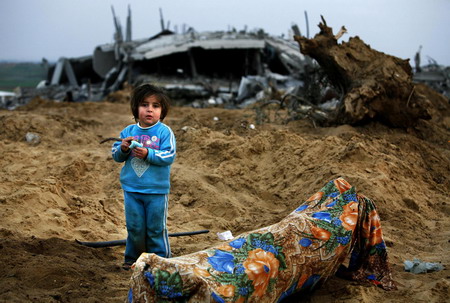GAZA CITY, Gaza Strip -- Uniformed Hamas security teams emerged on Gaza City's streets Monday as leaders of the Islamic militant group vowed to restore order in the shattered Palestinian territory after a three-week pummeling by the Israeli military. Hamas proclaimed it won a great victory over the Jewish state -- a view that appeared greatly exaggerated -- and the task of reconstruction faced deep uncertainty because of the fear of renewed fighting and Israel's control over border crossings.
 |
|
A Palestinian girl stands in front of a destroyed house on the outskirts of Jabalya in the northern Gaza Strip January 19, 2009. More Israeli forces left the Gaza Strip on Monday after a 22-day assault on Hamas militants, and both sides kept a ceasefire, allowing dazed Palestinians to survey the destruction and mourn their dead. [Agencies]
|
Cars and pedestrians again clogged streets. Donkey carts hauled produce and firewood past rubble and broken glass. The parliament building and other targets of Israeli attacks were piles of debris, while orange and olive groves on the edge of town were flattened.
UN Secretary-General Ban Ki-moon planned to travel to Gaza on Tuesday to inspect damage and visit UN facilities hit in the fighting. Ban did not scheduled meetings with officials from Hamas, whose government is not internationally recognized.
Israelis hope Gaza's civilians, who suffered heavily in the fighting that ended Sunday, will blame their militant rulers for provoking the Israeli assault with rocket attacks on southern Israel. Hamas, however, raced to capitalize on anger toward Israel and sought to show it remains unbowed and firmly in command of the Mediterranean coastal strip.
"We are still ready and capable of firing more rockets. We are developing the range of our rockets and the enemy will face more, and our rockets will hit new targets, God willing," said Abu Obeida, the spokesman for Hamas' military wing.
Despite the defiance, Gaza's Iran-backed leadership is likely to focus for now on assisting a traumatized population rather than re-igniting a full-blown conflict that could bring more misery to the area's 1.4 million people.
The high visibility of uniformed Hamas police stood in contrast to the furtive movements of Hamas fighters in civilian clothing who confronted or tried to evade the Israeli onslaught that began Dec. 27. Some have suspected the Islamic group was in disarray, but even some Israeli observers have acknowledged that the tightly knit organization remains largely intact.
"We've had orders to be back, make sure everything goes well," said a Hamas police officer who gave only his first name, Mahmoud.
In a sign of lingering tension, Israeli warships off the northern Gaza coast fired sporadic rounds of heavy bullets at beaches through the afternoon. An Israeli, meanwhile, was critically wounded in a shooting attack near a West Bank settlement blamed by police on "terrorists."
Israel and Hamas declared separate cease-fires Sunday.

